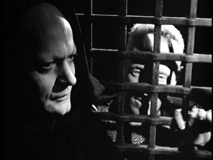Of Time and the River
Today is the feast day of Saint Gerard Manley Hopkins, "immortal diamond."
"At that instant he saw, in one blaze of light, an image of unutterable conviction, the reason why the artist works and lives and has his being--the reward he seeks--the only reward he really cares about, without which there is nothing. It is to snare the spirits of mankind in nets of magic, to make his life prevail through his creation, to wreak the vision of his life, the rude and painful substance of his own experience, into the congruence of blazing and enchanted images that are themselves the core of life, the essential pattern whence all other things proceed, the kernel of eternity."
— Thomas Wolfe, Of Time and the River
Thomas Wolfe
"entered the university at Chapel Hill at fifteen 'an awkward, unhappy misfit.' By the time he graduated, he was editor of the college newspaper...."
Jeff MacNelly, who died on this date in the Year of Our Lord 2000,
"in 1977 started drawing the comic strip 'Shoe'.... The strip was named in honor of the legendary Jim Shumaker, for whom MacNelly worked at the Chapel Hill Weekly."
From my Monday, June 2, 2003 entry:
Two quotations from "The Diamond Project":
"We all know that something is eternal," the Stage Manager says. "And it ain't houses and it ain't names, and it ain't earth, and it ain't even stars—everybody knows in their bones that something is eternal, and that something has to do with human beings."
— John Lahr, review of "Our Town"
"Set me as a seal upon your heart, as a seal upon your arm; for love is strong as death, passion fierce as the grave. Its flashes are flashes of fire, a raging flame."
— Song of Solomon
Here are some other thoughts from the same date, but a different time, fictional time, Faulkner time:
June Second, 1910
Where the shadow of the bridge fell I could see down for a long way, but not as far as the bottom. When you leave a leaf in water a long time after a while the tissue will be gone and the delicate fibers waving slow as the motion of sleep. They dont touch one another, no matter how knotted up they once were, no matter how close they lay once to the bones. And maybe when He says Rise the eyes will come floating up too, out of the deep quiet and the sleep, to look on glory.
— William Faulkner, The Sound and the Fury
The concluding link from my June 2, 2003, entry furnishes a clue to the timelessness of Quentin Compson's thoughts above:
Glory... Song of Songs 8. 7-8
From the King James Bible's rendition of the Song of Songs:
8:7 Many waters cannot quench love, neither can the floods drown it: if a man would give all the substance of his house for love, it would utterly be contemned.
8:8 We have a little sister, and she hath no breasts: what shall we do for our sister in the day when she shall be spoken for?
For Quentin Compson's thoughts on his little sister Caddy, consult the online hypertext edition of

![]() Joan Didion wrote that
Joan Didion wrote that![]() Washington Square Press paperback, 1981, page 222
Washington Square Press paperback, 1981, page 222


















Recent Comments